Configure and Troubleshoot Informacast
Available Languages
Download Options
Bias-Free Language
The documentation set for this product strives to use bias-free language. For the purposes of this documentation set, bias-free is defined as language that does not imply discrimination based on age, disability, gender, racial identity, ethnic identity, sexual orientation, socioeconomic status, and intersectionality. Exceptions may be present in the documentation due to language that is hardcoded in the user interfaces of the product software, language used based on RFP documentation, or language that is used by a referenced third-party product. Learn more about how Cisco is using Inclusive Language.
Contents
Introduction
This document describes the Cisco Paging Server product (also known as InformaCast) and how to integrate it with Cisco Unified Communications Manager (CUCM). This document will cover the purpose of the feature, configuration of the feature, what data to collect for troubleshooting, example analysis of the data, and related resources for additional research.
Prerequisites
Requirements
Cisco recommends that you have knowledge of these topics:
- Cisco Unified Communications Manager
- InformaCast
- SIP, CTI, Http and SNMP protocol.
Components Used
The information in this document is based on these software and hardware versions:
- InformaCast Version 11.5.2 - 38
- CUCM Versions 11.5.1.14900-8
- CP-8811 and CP-8861 sip88xx.12-0-1SR1-1
- Basic License
The information in this document was created from the devices in a specific lab environment. All the devices used in this document started with a cleared (default) configuration. If your network is live, make sure that you understand the potential impact of any command.
Background Information
Purpose of the Feature
The Cisco Paging Server is a paging/mass notification solution for thousands of phones, speakers, and other devices. This is especially useful in emergency situations with live, prerecorded audio, and/or text announcements.
Upon Original Equipment Manufacturer (OEM) agreement with Singlewire (InformaCast vendor), Cisco Technical Assistance Center (TAC) supports InformaCast from Version 8.3 together with CUCM Version 8.5 and later. The only mode supported by the Cisco TAC is Basic Paging.
Basic vs Advanced
Basic Paging mode supports live audio broadcast only for up to 50 phones per recipient group and require no additional license. The InformaCast version provided as part of CUCM includes a license for Basic Paging mode. Customers who need supplementary functionality can upgrade to Advanced Notification mode and be supported by Singlewire.
An advanced paging license allows unlimited paging groups. It also makes possible other advanced functions, including paging to overhead analog and IP speakers, bell scheduling, prioritizing emergency notifications with the call-barge option, prerecorded and text-only pages, integration with social media sites for notification, email and Short Message Service (SMS) mass notification and all-number monitoring, Emergency Services alerting, and integration with Cisco Jabber clients. After the installation of InformaCast, you can enable a trial of Advanced Notification mode.
Protocols Used
The Cisco Paging Server communicates with Unified CM using SIP, SNMP, AXL and CTI and beginning with Cisco Paging Server 9.0.1, either HTTP or JTAPI can be used to communicate with phones.
The Cisco Paging Server uses SNMP to find the other Unified CM nodes as well as a list of phones registered to each cluster member. Once the SNMP communications are complete, the Cisco Paging Server uses AXL to determine additional information regarding each registered phone, such as device name, description, device pool, calling search space, directory number, and location. This information can be used to build logical groups of phones, called recipient groups. As mentioned before, in the Cisco Paging Server with basic license, recipient groups can contain a maximum of 50 phones.
Note: A single Cisco Paging Server per Unified CM cluster is supported.
HTTP vs JTAPI
InformaCast versions prior to 9.x all used HTTP for phone activation. In HTTP mode, Cisco Paging Server sends commands and credentials to each IP phone HTTP server. IP phones validate these credentials and then execute the commands. At broadcast send time, InformaCast contacts them directly with the XML Services Interface (XSI) over HTTP.
In JTAPI mode, Cisco Paging sends commands to each phone via Unified CM. Cisco Paging Server does not need to send credentials with each request, so each phone does not have to activate its web server, and commands are executed more quickly. In addition, CTI mode allows faster checking of busy phones and activate them.
You can use HTTP or JTAPI regardless the type of integration (SIP or CTI) with CUCM. Keep in mind that JTAPI works better than HTTP on phones with non-English locale. In order to confirm the User locale take a look at the phone web page.

Note: In order to use JTAPI, take into consideration that CUCM version must be 9.1.2 or above, and Cisco 3905, 7902, 7905, 7912 phones are not supported.
SIP vs CTI
Informacast can receive calls through CTI and/or SIP. In the case of CTI, calls are serviced on a CTI Route Point (the Cisco Paging Server does not require CTI ports to answer inbound calls).
In the case of SIP, calls depart Unified CM on a SIP trunk. Both CTI and SIP are valid and supported. However, Cisco recommends SIP call flows over CTI because troubleshooting SIP integrations is much easier than CTI.
Configurations
Network Diagram
 Call flow
Call flow
- The caller (paging originator) dials a predefined number in Unified CM. E.g. 7777.
- Unified CM routes the call to the Cisco Paging Server over either a SIP trunk or CTI route point.
- The Cisco Paging Server answers the call.
- The caller hears a low stall tone. While the Cisco Paging Server plays this tone, instructions are sent via HTTP or JTAPI to each phone in the recipient group to join to the multicast group.
- Once all phones have joined the multicast group, the Cisco Paging Server plays a high go-ahead tone. When the caller hears this tone, it indicates that the Cisco Paging Server is ready to receive and sent the audio to the multicast IP and port.
- When the caller speaks, the media is sent from the caller’s phone to the Cisco Paging server, then from the Paging Server to the multicast IP address and port, and eventually from the multicast IP to the receiving phones.
- When the caller hangs up, the instruction is sent to each IP phone, this time to leave the multicast group, and the broadcast is over.
When InformaCast is integrated with Cisco Call Manager using the JTAPI library and Computer Telephony Integration (CTI) Manager it uses Quick Buffer Encoding (QBE) protocol over TCP as shown in the image.

For SIP integrations, InformaCast uses SIP protocol over TCP and port 5060 to communicate with Call Manager as shown in the image.

Configure Call Manager
Step 1. Activate services, navigate to Cisco Unified Serviceability > Tools > Service Activation and enable the following services:
- Cisco CallManager
- Cisco CTIManager
- Cisco AXL Web Service
- Cisco CallManager SNMP Service
Tip: Activate SNMP on all nodes, AXL on at least one node in the cluster, and CTI Manager on at least one node running the Call Manager service (or more for redundancy purposes).
Step 2. Configure SNMP (version 2 or version 3)
For SNMP v2
- Navigate to Cisco Unified Serviceability > SNMP > v1/v2.
- Configure the community string name with access privilege of ReadOnly.
- Apply to All Nodes checkbox, if possible and click on Save.

For SNMP v3
- Navigate to Cisco Unified Serviceability > SNMP > V3 > User and create a user named ICVA.
- Enable the Authentication Required checkbox, enter an authentication password and select the SHA radio button.
- Enable the Privacy Required checkbox, enter a privacy password and select the AES128 radio button.
- Select ReadOnly from the Access Privileges dropdown menu and select the Apply To All Nodes checkbox, if possible and click on Save.

Step 3. Set the Default Codec to G.711
- Navigate to CM Administration > System > Region Information > Region and create a new region, e.g. ICVA.
- Select all your regions in the Regions area, and configure 64kbps (G.722, G.711) as the Maximum Audio Bit Rate.
- Select the None radio button in the Max Video Call Bit Rate and click on Save.

Note: The multicast media streams always use the G.711 mu-law codec. No other codecs are allowed or supported. Calls arriving to Informacast using other codecs must be transcoded.
Step 4. Create a Device Pool
- Navigate to CM Administration > System > Device Pool and create a device pool. E.g. Name it ICVA_DP.
- Add the ICVA region you just created to it.
- Select Disable from the SRST Reference dropdown menu.
- Select On from the Join Across Lines dropdown menu and click on Save.

Step 5. Create a Route Partition, e.g. ICVA_PT.
Step 6. Create a Calling Search Space, e.g. ICVA_CSS. Include the ICVA_PT.
Step 7. Create an Access Control Group (AXL).
- Navigate to CM Admin > User Management > User Settings > Access Control Group and create an access control group, e.g. ICVA User Group.
- Add the Standard AXL API Access role to it.
Note: You may already have an access control group named Standard AXL API Access with the Standard AXL API Access role added to it, which you can also use.
Step 8. Create an Application User
- Navigate to CM Admin > User Management > Application User and click on Add New. Name the application user as ICVA_InformaCast and assign these roles:
- Standard CTI Enabled
- ICVA User Group (or Standard AXL API Access)
- Standard CTI Allow Control of Phones Supporting Connected Xfer and Conf.
- Standard CTI Allow Control of Phones Supporting Rollover Mode
- Standard CTI Allow Control of All Devices

Warning: Per defect CSCve47332  , it is recommended not to use spaces for the application User ID.
, it is recommended not to use spaces for the application User ID.
Step 9. Integrate Communications Manager with Informacast using SIP or CTI.
For SIP integration, create a SIP profile, a SIP Trunk and a Route Pattern.
- Navigate to CM Admin> Device > Device Settings > SIP Profile and click on the Standard SIP Profile then click on the Copy
- Name the profile as ICVA SIP Profile and select Best Effort (no MTP inserted). Click on Save.
- Navigate to CM Admin > Device > Trunk and click on the Add New
- Select SIP Trunk from the trunk type dropdown menu. Click on Next and enter a name for your SIP trunk.
- Select the device pool ICVA_DP, scroll down to the SIP Information area and enter the IP address of your InformaCast server in the Destination Address
- Ensure that the value in the Destination Port field is 5060, select the Non Secure SIP Trunk Profile, and assign the SIP profile you created before from the SIP Profile dropdown menu. Click on Save.
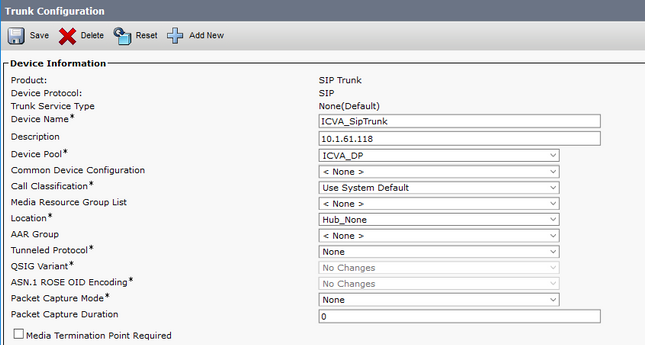

- Create the route pattern, navigate to CM Admin > Call Routing > Route Hunt > Route pattern, click on Add New.
- Enter a route pattern, e.g. 7777 and configure a partition that is reachable from the phones, e.g. ICVA_PT.
- Select the SIP trunk you just created from the Gateway/Route List dropdown menu.
- Select the Route This Pattern and the OnNet radio buttons.
- Uncheck the Provide Outside Dial Tone checkbox and click on Save.
For CTI integration, create a CTI route point and associate to the Application User created in step 8.
- Navigate to CM Administration > Device > CTI Route Point and click on Add new.
- Enter a name, e.g. ICVA_CTI_RP (or whatever you prefer).
- Assign the device pool ICVA_DP and click on Save.
- Select the line 1, enter a directory number, e.g. 7778, and assign the recently created partition (ICVA_PT).
- Configure the rest of information as desired and click on Save.
Add the CTI route point(s) as controlled devices on the ICVA application user's configuration.

Note: InformaCast can support multiple CTI route points if they are created in Communications Manager and associated to the InformaCast application user.
Tip: Instead of creating a CTI route point for every number you need for DialCasts, you could also add multiple lines to a single CTI route point. Another option would be to use wild card patterns to match a range of numbers.
Step 10. Enable Web Access for Cisco IP Phones to use HTTP to control the phones.
- Web access can be configured per device, per common device profile, or system-wide in the Enterprise Phone Configuration.
- In order to apply the change in Enterprise phone configurations, navigate to CM Admin > System > Enterprise Phone Configuration, scroll down to the Web Access dropdown menu and select Enabled. Click on Save.
- Reset the phones to apply the changes.

Step 11. Set the Authentication URL.
Change the authentication URL in order to send authentication requests from IP phones to InformaCast. All non-InformaCast authentication requests are redirected back to the default CUCM authentication URL.
- Navigate to CM Administration > System > Enterprise parameters.
- Enter http://<InformaCast Virtual Appliance IP Address>:8081/InformaCast/phone/auth in the URL Authentication field and Secure Authentication URL.
- Click on Save, Apply config and Reset the phones.

Note: The URL is case sensitive, so make sure that the I and C in the word InformaCast are capitalized. Both the secure authentication URL and the authentication URL must be set to the same value, the HTTP URL.
Step 12. Set the Authentication Method for API Browser Access.
- If you’re using Unified Communications Manager 11.5.1 and later, scroll down the page to the Security Parameters area and select Basic from the Authentication Method for API Browser Access dropdown menu.
Step 13. Test your phones, e.g. dial 7777 (for SIP integration) or 7778 (for CTI integration).
Note: If you are running Unified Communications Manager in mixed mode, ensure that calls to and from InformaCast are not using encrypted media.
Configure Informacast
Step 1. Configure the Communications Manager Cluster in Informacast.
- Log in to Informacast and navigate to Admin > Telephony > Unified Communications Manager Cluster. Click on Edit.
- Enter the application user’s username and password for the Application User that you created in step 8.
- Make sure the Use Application User for AXL checkbox is selected, meaning that your application user credentials are used when building InformaCast’s phone cache.
Note: If you leave this field blank, InformaCast will attempt to find a server running the AXL service among those servers running the CallManager service.
- Enter the IP address of the Unified Communications Manager server(s) in the Communications Manager IP Address(es) field. Use the numeric IP addresses rather than DNS names.
- Select the SNMP v2 or SNMP v3 radio button. Enter the same information configured in CUCM. Click on Update.
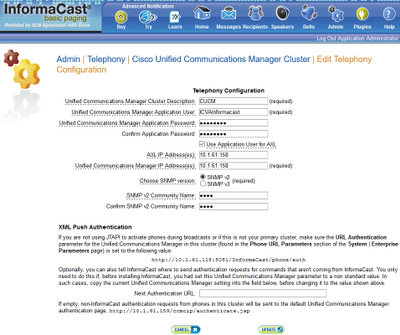
Step 2. Configure the Recipient Group.
- Navigate to Recipients > Edit recipient Groups and click on Update in order to show all the phones registered in CUCM and discovered by InformaCast.

- In order to create a new Recipient Group click on Add, write a name and then click on Edit to add the phones for this recipient group. Once the phones were added to the recipient, click on Submit.
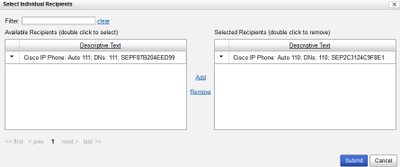
- To save the changes click on Update.

Step 3. Allow/Disable SIP Access to InformaCast.
- Navigate to Admin > SIP > SIP Access. By default, all SIP calls are denied.
- Select the Allow radio button allows all SIP calls or click on Add to allow exceptions to this allowance.

Tip: When defining exceptions, make sure to specify the host that directly sends the INVITE request to InformaCast. This may be a SIP proxy server if proxies stand between InformaCast and the calling host.
Step 4. Add a Broadcast Dialing Configuration
- Go to Admin > DialCast > Dialing Configurations, click the Add
- Enter a dialing pattern (e.g. 7777, 7778) in the Dialing Pattern field according to the Route pattern (for SIP integration) or CTI Route Point (for CTI integration) created in CUCM.
- Select the recipient groups from the list and click on Update.
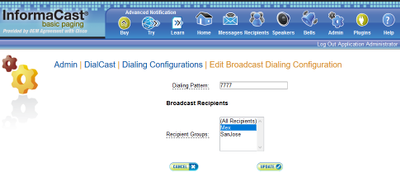
Step 5. Configure the broadcast parameters.
- Navigate to Admin > Broadcast Parameters
- Configure the IP for multicast. The default IP (239.0.1.2) is commonly used.
- Enable the JTAPI checkbox if you want to send the commands to the phones as JTAPI, otherwise HTTP messages will be used.
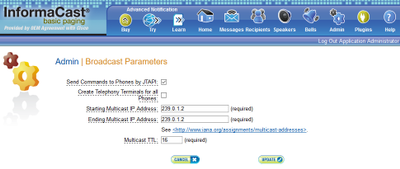
Ensure that this range corresponds to your network infrastructure settings and covers all recipient groups. In multisite deployments, Singlewire and Cisco recommend that a range of addresses be used. This range should be large enough in order to handle one address for each simultaneous broadcast.
Note: The use of JTAPI is recommended over HTTP since it better monitors the status of phones and works with more locales.
Tip: The default settings for the web interface will log you out after five minutes. Navigate to Admin > Network Parameters > Session Timeouts and change the General Session Timeout (seconds) field from 300 to the new value.
Configure Multicast in the Network
If the Cisco Paging Server and IP phones are on separate IP subnets, the routers in between those two subnets must be configured for multicast routing.
The Cisco Paging Server does not require any particular method of multicast routing (SM, DM, S-DM, SSM, and so forth). Some wide area network environments do not support multicast routing. For those environments, GRE tunnels may be built between sites and used to transport multicast.
The design and configuration of multicast in your environment is outside the scope of this document, but you may find the following resources helpful:
Note: If you are using Meraki switches, they have IGMP snooping enabled by default. This can cause issues and needs to be disabled by Meraki. Once you contact them and have them disable IGMP snooping, test the paging again.
Verify
There is currently no verification procedure available for this configuration.
Troubleshoot
Common Issues
Phones not Activated
Take into consideration that Informacast skips any phones that are in use (busy) when the broadcast occurs.
InformaCast uses different busy detection methods depending on how you send messages to the phones (HTTP or JTAPI).
HTTP: Busy detection only works with phone locales running English loads
CTI: Works with non-English phone locales
Busy detection also works differently according to protocol as well as line type and line state.
|
Line status |
CTI busy detection |
HTTP busy detection |
|
Shared line with call in use on another phone, no call on hold |
Idle |
Idle |
|
Off hook, collect digits |
Busy |
Not busy |
|
Talking, active call |
Busy |
Busy |
|
On hold, inactive call on shared line |
Busy |
Not busy |
|
On hold, inactive call on unique line |
Busy |
Not busy |
Note: If there are simultaneous broadcasts attempted, Informacast plays the first broadcast first (the second broadcast is bumped).
When troubleshooting a phone not being activated you should collect the following data:
- Performance logs from Informacast.
- Console logs (PRT) from the phone.
Phones not Discovered
Only registered phones are discovered by InformaCast. If an IP phone is registered but not discovered, check the SNMP service configuration in Informacast and the CUCM node where the phone is registered to. The SNMP service and community string should be configured for all nodes where the Call Manager service is activated.
SNMP Error Unable to build recipient groups: java.lang.Exception
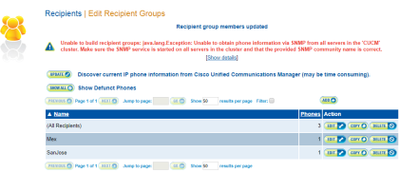
- The error means that SNMP fails to respond to queries in a timely manner due to DNS connectivity or resolution.
- Confirm that nothing is blocking UDP port 161 from the InformaCast server to all Unified Communications Manager cluster nodes.
- Confirm that SNMP information is correct. Navigate to Admin > Telephony > Unified Communications Manager Cluster and type a new SNMP string if possible. Configure the new string in CUCM.
- You may also be using a community string that exceeds the maximum number of characters for the community string. If you are copying the community string from CUCM and pasting it into the Informacast configuration, try typing it in to see if you can type the whole string. In Informacast version 11 the maximum number of characters is 18.
- Check your DNS configuration on CUCM is correct and confirm you are not matching the defect CSCtb70375.
No Audio on the Destination Phones
If phones light up but don't play the audio the issue is most likely related with multicast routing and not with your CUCM server or IP phones.
Data to Collect
When troubleshooting Informacast you should collect the following data:
- Performance logs from Informacast.
- Packet capture from Informacast.
- Packet capture from the phones.
- Packet capture from CUCM.
- SDL logs from CUCM
- PRT (console logs)
Performance Logs
There are two methods to get the performance logs from Informacast.
Method 1
- Navigate to https://<Informacast IP>:8444/InformaCast/logs/performance.log
- Copy the and save the log into a .txt file.
Method 2
- Open the Informacast IP in a web browser, https://<informacast_IP> and select Informacast.
- Use your credentials to log in and navigate to Help > Support.

3. Click on Performance Logs under the Tools section as shown in the image.

Packet Capture
From Informacast
There are three methods to get a packet capture from Informacast.
Method 1
- Connect to the CLI of the Informacast box via SSH
- Execute the command sudo capturePackets test.cap to start capturing and create a file named test.cap
- Page out to the phones that aren't working
- Hit Ctrl + C to end the pcap
- Execute ls to ensure the packet capture is on the box
- use SFTP or Secure Copy (SCP) in order to transfer the file to your PC

Method 2
- Download and install InformaCast_LogTool from the web.
- Execute the software and select the option [5]. Write the IP of Informacast, the login credentials and the seconds that the packet capture should run as shown in the image.

- The capture will not start immediately, this allows you to prepare your test environment. When ready, select option [1] and press Enter to start the capture of packets as shown in the image.

- The tool will display a countdown timer with the outstanding duration of the capture. Replicate the issue during this time and when the capture countdown reaches zero the capture is complete and stops.
- The tool bundles the packet capture and all the logs into a .tgz file and transfers it to your workstation. This is the same as option 1 to gather logs, but also includes the network traffic capture.
- The tool will create a folder with the packet capture in the base directory of the Informacast_LogTool.exe as shown in the image.

Method 3 (Available in versions 12.0.1 and above)
- Log into <Informacast_IP>:10000
- Navigate to System > Capture Network Traffic.

- Click on Start a new packet capture and replicate the issue as shown in the image.

- Click on Stop Packet Capture when the issue is totally replicated, or it stops by itself after capturing 33,000 packets.
- Navigate to System > Collect Logs, enter a short description of the problem and click on Collect a new set of logs.
- In order to save the logs click on Download to Your Computer as shown in the image.

Method 4 (Available in version 12.0.1 and above)
In version 12.0.1 and later sudo command is no longer required. In order to run a packet capture use the command capture-packets <name of the file> <number of packets> as shown in the example:
admin@informacast:~$ capture-packets test Saving up to 33000 packets to /var/log/capture-packets/test tcpdump: listening on eth0, link-type EN10MB (Ethernet), capture size 1514 bytes ^C13 packets captured 15 packets received by filter 0 packets dropped by kernel Interrupt signaled. Cleaning up.
Note: The GUI method is better than the CLI since there is no dependency on an SFTP server, and you can start, stop and download the packet capture from the web page.
From CUCM
Define from where you need to get packet capture according to your deployment. You can have only one CUCM node or multiple CUCM in the cluster.
- If you have one CUCM node, get the packet capture as shown in the image.

- If you have a CUCM cluster and one node is communicating with Informacast but another is communicating with the phones, then get the packet capture as shown in the image.
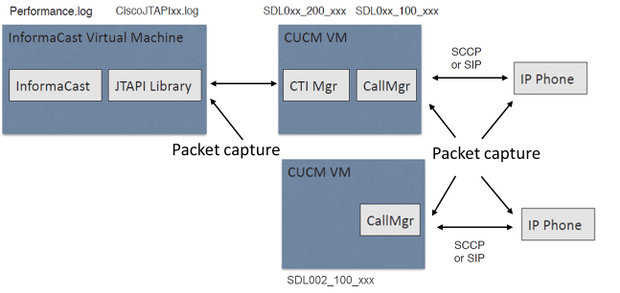
- Open a SSH session for the node where you need to capture
- Run the command utils network capture eth0 size all count 1000000 file Test to start the packet capture.
- Replicate the issue
- Stop the packet capture with Ctrl + C
- In order to confirm that the packet capture was save, run the command file list activelog platform/cli/*

- Use the command file get activelog platform/cli/Test.cap to send the packet capture to a SFTP server. Alternatively, to collect all .cap files stored on the server, use file get activelog platform/cli/*.cap

- Use RTMT in case you are not able to use an SFTP server. Navigate to System > Trace & Log Central > Collect Files. Click on Next and enable the Packet capture logs checkbox as shown in the image.
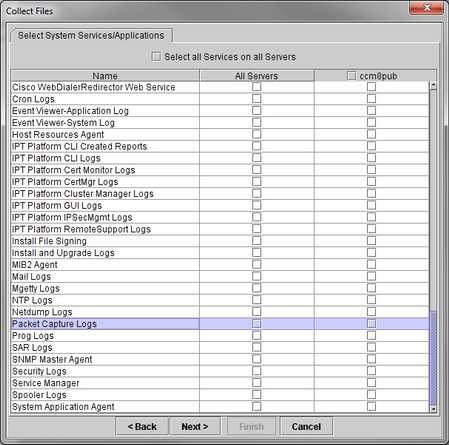
- Click on Next, select a download file directory and click on Finish.
- Delete the packet with the command file delete activelog platform/cli/Test.cap
From the Phone
- Activate the SPAN to PC port. Navigate to CM Admin page > Device > phone and find the phone reported with issues.
- Under Product Specific Configuration Layout section, find Span to PC Port and select Enable from the drop-down menu. Click on Save and then on Apply config.
- Connect a laptop to the PC-port of the phone.
- Run the packet analyzer software in the laptop. You can use Wireshark (or other packet capture software).
- Replicate the issue.
- When the issue is totally replicated proceed to stop the packet capture.
You can find more details in the following link: https://supportforums.cisco.com/document/44741/collecting-packet-capture-cisco-ip-phone
Example Analysis

SDL Traces
For SIP integration and phones controlled by JTAPI
CUCM: 10.1.61.158
Informacast: 10.1.61.118
Phone A
DN: 110
Model: CP-8861
Firmware version: sip88xx.12-0-1SR1-1
Phone A IP address: 10.1.61.12
MAC SEP2C3124C9F8E1
Phone B
DN: 111
Model: CP-8811
Firmware version: sip88xx.12-0-1SR1-1
Phone B IP address: 10.1.61.11
MAC SEPF87B204EED99
Dialcast number: 7777
#### CUCM receives the invite from Phone A 71439050.002 |19:00:35.206 |AppInfo |SIPTcp - wait_SdlReadRsp: Incoming SIP TCP message from 10.1.61.12 on port 51600 index 25770 with 1791 bytes: [431528,NET] INVITE sip:7@10.1.61.158;user=phone SIP/2.0 Via: SIP/2.0/TCP 10.1.61.12:51600;branch=z9hG4bK18a14280 From: "PhoneA" <sip:110@10.1.61.158>;tag=2c3124c9f8e10c3c246b7956-5c62fa57 To: <sip:7@10.1.61.158> Call-ID: 2c3124c9-f8e1000d-00337209-0547bb10@10.1.61.12 Max-Forwards: 70 Session-ID: 712c9e1f00105000a0002c3124c9f8e1;remote=00000000000000000000000000000000 Date: Tue, 10 Sep 2019 00:00:37 GMT CSeq: 101 INVITE User-Agent: Cisco-CP8861/12.0.1 Contact: <sip:142b9f25-7f2b-48a8-9ff9-377f616f3084@10.1.61.12:51600;transport=tcp>;+u.sip!devicename.ccm.cisco.com="SEP2C3124C9F8E1" Expires: 180 Accept: application/sdp Allow: ACK,BYE,CANCEL,INVITE,NOTIFY,OPTIONS,REFER,REGISTER,UPDATE,SUBSCRIBE,INFO Remote-Party-ID: "PhoneA" <sip:110@10.1.61.158>;party=calling;id-type=subscriber;privacy=off;screen=yes Supported: replaces,join,sdp-anat,norefersub,resource-priority,extended-refer,X-cisco-callinfo,X-cisco-serviceuri,X-cisco-escapecodes,X-cisco-service-control,X-cisco-srtp-fallback,X-cisco-monrec,X-cisco-config,X-cisco-sis-7.0.0,X-cisco-xsi-8.5.1 Allow-Events: kpml,dialog Recv-Info: conference Recv-Info: x-cisco-conference Content-Length: 548 Content-Type: application/sdp Content-Disposition: session;handling=optional v=0 o=Cisco-SIPUA 11811 0 IN IP4 10.1.61.12 s=SIP Call b=AS:4064 t=0 0 m=audio 22018 RTP/AVP 114 9 124 0 8 116 18 101 c=IN IP4 10.1.61.12 b=TIAS:64000 a=rtpmap:114 opus/48000/2 a=fmtp:114 maxplaybackrate=16000;sprop-maxcapturerate=16000;maxaveragebitrate=64000;stereo=0;sprop-stereo=0;usedtx=0 a=rtpmap:9 G722/8000 a=rtpmap:124 ISAC/16000 a=rtpmap:0 PCMU/8000 a=rtpmap:8 PCMA/8000 a=rtpmap:116 iLBC/8000 a=fmtp:116 mode=20 a=rtpmap:18 G729/8000 a=fmtp:18 annexb=yes a=rtpmap:101 telephone-event/8000 a=fmtp:101 0-15 a=sendrecv ### CUCM performs digit analysis for the dialed digits (dd="7777") 71439203.000 |19:00:36.580 |SdlSig |DaReq |wait |Da(1,100,216,1) |Cdcc(1,100,224,6) |1,100,14,1368.16^10.1.61.12^* |[R:N-H:0,N:0,L:0,V:0,Z:0,D:0] CI=19282342 Fqdn=ti=1nd=110pi=0si1 Cgpn=tn=0npi=0ti=1nd=110pi=1si1 DialedNum=tn=0npi=1ti=1nd=7777User=7777Host=10.1.61.158Port=5060PassWord=Madder=Transport=4mDisplayName=RawUrl=sip:7@10.1.61.158;user=phoneOrigPort=0pi=0si1 requestID=0 DigitAnalysisComplexity=1 CallingUser= IgnoreIntercept=0 callingDeviceName=SEP2C3124C9F8E1 71439203.001 |19:00:36.580 |AppInfo |Digit Analysis: star_DaReq: daReq.partitionSearchSpace(8653f609-05a7-5914-819b-3a89680af6a2:), filteredPartitionSearchSpaceString(Informacast_PT:phone_pt), partitionSearchSpaceString(Informacast_PT:phone_pt) 71439203.002 |19:00:36.580 |AppInfo |Digit Analysis: Host Address=10.1.61.158 MATCHES this node's IPv4 address. 71439203.003 |19:00:36.580 |AppInfo |Digit Analysis: star_DaReq: Matching SIP URL, Numeric User, user=7777 71439203.012 |19:00:36.588 |AppInfo |Digit analysis: match(pi="2", fqcn="110", cn="110",plv="5", pss="Informacast_PT:phone_pt", TodFilteredPss="Informacast_PT:phone_pt", dd="7777",dac="1") 71439203.013 |19:00:36.588 |AppInfo |Digit analysis: analysis results 71439203.014 |19:00:36.588 |AppInfo ||PretransformCallingPartyNumber=110 |CallingPartyNumber=110 |DialingPartition=Informacast_PT |DialingPattern=7777 |FullyQualifiedCalledPartyNumber=7777 |DialingPatternRegularExpression=(7777) |DialingWhere= |PatternType=Enterprise |PotentialMatches=NoPotentialMatchesExist |DialingSdlProcessId=(0,0,0) |PretransformDigitString=7777 |PretransformTagsList=SUBSCRIBER |PretransformPositionalMatchList=7777 |CollectedDigits=7777 |UnconsumedDigits= |TagsList=SUBSCRIBER |PositionalMatchList=7777 |VoiceMailbox= |VoiceMailCallingSearchSpace= |VoiceMailPilotNumber= |RouteBlockFlag=RouteThisPattern |RouteBlockCause=0 |AlertingName= |UnicodeDisplayName= |CallableEndPointName=[ddef6b78-6232-f5eb-b286-79292be99bb5] #### CUCM determines call must stay on the same node, then it sends the call to SIP Trunk PID=SIPD(1,100,84,12) 71439207.001 |19:00:36.588 |AppInfo |Digit analysis: wait_DmPidRes- Partition=[107a02ea-a384-5219-3670-ba9d14b9d094] Pattern=[7777] Where=[],cmDeviceType=[Unknown], OutsideDialtone =[0], DeviceOverride=[0], PID=SIPD(1,100,84,12),CI=[19282342],Sender=Cdcc(1,100,224,6) ### CUCM extends the call to the Informacast SIP Trunk 71439248.001 |19:00:36.643 |AppInfo |SIPTcp - wait_SdlSPISignal: Outgoing SIP TCP message to 10.1.61.118 on port 5060 index 25758 [431545,NET] INVITE sip:7777@10.1.61.118:5060 SIP/2.0 Via: SIP/2.0/TCP 10.1.61.158:5060;branch=z9hG4bK1996d1e0c5e3e From: "PhoneA" <sip:110@10.1.61.158>;tag=229417~7cc9781e-f7e3-4c51-a2b9-de353a4e7d6f-19282343 To: <sip:7777@10.1.61.118> Date: Tue, 10 Sep 2019 00:00:36 GMT Call-ID: 2d72f80-d761e7a4-1996c-9e3d010a@10.1.61.158 Supported: timer,resource-priority,replaces Min-SE: 1800 User-Agent: Cisco-CUCM11.5 Allow: INVITE, OPTIONS, INFO, BYE, CANCEL, ACK, PRACK, UPDATE, REFER, SUBSCRIBE, NOTIFY CSeq: 101 INVITE Expires: 180 Allow-Events: presence, kpml Supported: X-cisco-srtp-fallback,X-cisco-original-called Call-Info: ;method="NOTIFY;Event=telephone-event;Duration=500" Call-Info: ;x-cisco-video-traffic-class=DESKTOP Session-ID: 712c9e1f00105000a0002c3124c9f8e1;remote=00000000000000000000000000000000 Cisco-Guid: 0047656832-0000065536-0000000001-2654798090 Session-Expires: 1800 P-Asserted-Identity: "PhoneA" <sip:110@10.1.61.158> Remote-Party-ID: "PhoneA" <sip:110@10.1.61.158>;party=calling;screen=yes;privacy=off Contact: <sip:110@10.1.61.158:5060;transport=tcp>;+u.sip!devicename.ccm.cisco.com="SEP2C3124C9F8E1" Max-Forwards: 69 Content-Type: application/sdp Content-Length: 552 v=0 o=CiscoSystemsCCM-SIP 229417 1 IN IP4 10.1.61.158 s=SIP Call c=IN IP4 10.1.61.12 b=TIAS:64000 b=AS:64 t=0 0 m=audio 22018 RTP/AVP 114 9 124 0 8 116 18 101 b=TIAS:64000 a=rtpmap:114 opus/48000/2 a=fmtp:114 maxplaybackrate=16000;sprop-maxcapturerate=16000;maxaveragebitrate=64000;stereo=0;sprop-stereo=0;usedtx=0 a=rtpmap:9 G722/8000 a=rtpmap:124 iSAC/16000 a=rtpmap:0 PCMU/8000 a=rtpmap:8 PCMA/8000 a=rtpmap:116 iLBC/8000 a=maxptime:20 a=fmtp:116 mode=20 a=rtpmap:18 G729/8000 a=rtpmap:101 telephone-event/8000 a=fmtp:101 0-15 #### Informacast replies with 200 OK (Call established using codec PCMU) 71439316.004 |19:00:36.849 |AppInfo |SIPTcp - wait_SdlReadRsp: Incoming SIP TCP message from 10.1.61.118 on port 5060 index 25758 with 889 bytes: [431549,NET] SIP/2.0 200 OK CSeq: 101 INVITE Call-ID: 2d72f80-d761e7a4-1996c-9e3d010a@10.1.61.158 From: "PhoneA" <sip:110@10.1.61.158>;tag=229417~7cc9781e-f7e3-4c51-a2b9-de353a4e7d6f-19282343 To: <sip:7777@10.1.61.118>;tag=2c9be8b4 Via: SIP/2.0/TCP 10.1.61.158:5060;branch=z9hG4bK1996d1e0c5e3e;rport=43802 Content-Type: application/sdp Contact: "InformaCast" <sip:7777@10.1.61.118;transport=tcp> Allow: ACK,BYE,CANCEL,INFO,INVITE,OPTIONS,NOTIFY Accept: application/sdp Accept-Encoding: identity Accept-Language: en Supported: Call-Info: <sip:7777@10.1.61.118:5060>;method="NOTIFY;Event=telephone-event;Duration=500" Content-Length: 248 v=0 o=SinglewireInformaCast-SIP 1568074182370 1 IN IP4 10.1.61.118 s=SIP Call c=IN IP4 10.1.61.118 b=TIAS:64000 b=AS:64 t=0 0 m=audio 32070 RTP/AVP 0 101 a=rtpmap:0 PCMU/8000 a=rtpmap:101 telephone-event/8000 a=fmtp:101 0-15 a=ptime:20 #### ACK from CUCM to Informacast 71439319.001 |19:00:36.850 |AppInfo |SIPTcp - wait_SdlSPISignal: Outgoing SIP TCP message to 10.1.61.118 on port 5060 index 25758 [431550,NET] ACK sip:7777@10.1.61.118;transport=tcp SIP/2.0 Via: SIP/2.0/TCP 10.1.61.158:5060;branch=z9hG4bK1996e72237022 From: "PhoneA" <sip:110@10.1.61.158>;tag=229417~7cc9781e-f7e3-4c51-a2b9-de353a4e7d6f-19282343 To: <sip:7777@10.1.61.118>;tag=2c9be8b4 Date: Tue, 10 Sep 2019 00:00:36 GMT Call-ID: 2d72f80-d761e7a4-1996c-9e3d010a@10.1.61.158 User-Agent: Cisco-CUCM11.5 Max-Forwards: 70 CSeq: 101 ACK Allow-Events: presence, kpml Content-Length: 0 ### CUCM sends 200 OK to Phone A with codec PCMU 71439437.001 |19:00:36.884 |AppInfo |SIPTcp - wait_SdlSPISignal: Outgoing SIP TCP message to 10.1.61.12 on port 51600 index 25770 [431551,NET] SIP/2.0 200 OK Via: SIP/2.0/TCP 10.1.61.12:51600;branch=z9hG4bK18a14280 From: "PhoneA" <sip:110@10.1.61.158>;tag=2c3124c9f8e10c3c246b7956-5c62fa57 To: <sip:7@10.1.61.158>;tag=229414~7cc9781e-f7e3-4c51-a2b9-de353a4e7d6f-19282342 Date: Tue, 10 Sep 2019 00:00:35 GMT Call-ID: 2c3124c9-f8e1000d-00337209-0547bb10@10.1.61.12 CSeq: 101 INVITE Allow: INVITE, OPTIONS, INFO, BYE, CANCEL, ACK, PRACK, UPDATE, REFER, SUBSCRIBE, NOTIFY Allow-Events: presence Supported: replaces Server: Cisco-CUCM11.5 Call-Info: ; security= NotAuthenticated; orientation= to; gci= 1-15008; isVoip; call-instance= 1 Send-Info: conference, x-cisco-conference Remote-Party-ID: <sip:7777@10.1.61.158>;party=called;screen=no;privacy=off Session-ID: ddef6b786232f5ebb2867929ab229417;remote=712c9e1f00105000a0002c3124c9f8e1 Remote-Party-ID: <sip:7777@10.1.61.158;user=phone>;party=x-cisco-original-called;privacy=off Contact: <sip:7@10.1.61.158:5060;transport=tcp> Content-Type: application/sdp Content-Length: 235 v=0 o=CiscoSystemsCCM-SIP 229414 1 IN IP4 10.1.61.158 s=SIP Call c=IN IP4 10.1.61.118 b=AS:64 t=0 0 m=audio 32070 RTP/AVP 0 101 b=TIAS:64000 a=ptime:20 a=rtpmap:0 PCMU/8000 a=rtpmap:101 telephone-event/8000 a=fmtp:101 0-15 #### ACK from Phone A to CUCM 71439438.002 |19:00:36.950 |AppInfo |SIPTcp - wait_SdlReadRsp: Incoming SIP TCP message from 10.1.61.12 on port 51600 index 25770 with 692 bytes: [431552,NET] ACK sip:7@10.1.61.158:5060;transport=tcp SIP/2.0 Via: SIP/2.0/TCP 10.1.61.12:51600;branch=z9hG4bK20553712 From: "PhoneA" <sip:110@10.1.61.158>;tag=2c3124c9f8e10c3c246b7956-5c62fa57 To: <sip:7@10.1.61.158>;tag=229414~7cc9781e-f7e3-4c51-a2b9-de353a4e7d6f-19282342 Call-ID: 2c3124c9-f8e1000d-00337209-0547bb10@10.1.61.12 Max-Forwards: 70 Session-ID: 712c9e1f00105000a0002c3124c9f8e1;remote=ddef6b786232f5ebb2867929ab229417 Date: Tue, 10 Sep 2019 00:00:39 GMT CSeq: 101 ACK User-Agent: Cisco-CP8861/12.0.1 Remote-Party-ID: "PhoneA" <sip:110@10.1.61.158>;party=calling;id-type=subscriber;privacy=off;screen=yes Content-Length: 0 Recv-Info: conference Recv-Info: x-cisco-conference #### Since integration is with JTAPI, CUCM sends REFER to the phone with instructions to join to the IP and port of multicast 71439541.002 |19:00:38.199 |AppInfo |SIPTcp - wait_SdlSPISignal: Outgoing SIP TCP message to 10.1.61.11 on port 51784 index 25768 [431557,NET] REFER sip:e2881942-2853-4eab-a0d9-96228c79d062@10.1.61.11:51784;transport=tcp SIP/2.0 Via: SIP/2.0/TCP 10.1.61.158:5060;branch=z9hG4bK19970687ccd2b From: <sip:111@10.1.61.158>;tag=1598606730 To: <sip:111@10.1.61.11> Call-ID: 4085c80-d761e7a6-1996d-9e3d010a@10.1.61.158 CSeq: 101 REFER Max-Forwards: 70 Contact: <sip:111@10.1.61.158:5060;transport=tcp> User-Agent: Cisco-CUCM11.5 Expires: 30 Refer-To: cid:1234567890@10.1.61.158 Content-Id: <1234567890@10.1.61.158> Content-Type: multipart/mixed;boundary=uniqueBoundary Mime-Version: 1.0 Referred-By: <sip:111@10.1.61.158> Content-Length: 682
--uniqueBoundary
Content-Type:application/x-cisco-remotecc-request+xml
<x-cisco-remotecc-request>
<datapassthroughreq>
<applicationid>0</applicationid>
<lineid>0</lineid>
<transactionid>109</transactionid>
<stationsequence>StationSequenceLast</stationsequence>
<displaypriority>2</displaypriority>
<appinstance>0</appintance>
<routingid>0</routingid>
<confid>0</confid>
<featuredata></featuredata>
</datapassthroughreq>
</x-cisco-remotecc-request>
--uniqueBoundary
Content-Type:application/x-cisco-remote-cm+xml
<CiscoIPPhoneExecute><ExecuteItem URL="RTPMRx:239.0.1.2:20480"/></CiscoIPPhoneExecute>
--uniqueBoundary--
#### Phone B replies with 202 Accepted 71439542.002 |19:00:38.215 |AppInfo |SIPTcp - wait_SdlReadRsp: Incoming SIP TCP message from 10.1.61.11 on port 51784 index 25768 with 571 bytes: [431558,NET] SIP/2.0 202 Accepted Via: SIP/2.0/TCP 10.1.61.158:5060;branch=z9hG4bK19970687ccd2b From: <sip:111@10.1.61.158>;tag=1598606730 To: <sip:111@10.1.61.11>;tag=f87b204eed990c3a4020c613-5969341f Call-ID: 4085c80-d761e7a6-1996d-9e3d010a@10.1.61.158 Session-ID: f9d4984b00105000a000f87b204eed99;remote=00000000000000000000000000000000 Date: Tue, 10 Sep 2019 00:00:40 GMT CSeq: 101 REFER Server: Cisco-CP8811/12.0.1 Contact: <sip:e2881942-2853-4eab-a0d9-96228c79d062@10.1.61.11:51784;transport=tcp>;+u.sip!devicename.ccm.cisco.com="SEPF87B204EED99" Content-Length: 0 #### Phone B sends a NOTIFY to indicate that it was activated (Data="Success") 71439548.004 |19:00:38.453 |AppInfo |SIPTcp - wait_SdlReadRsp: Incoming SIP TCP message from 10.1.61.11 on port 51784 index 25768 with 2006 bytes: [431559,NET] NOTIFY sip:111@10.1.61.158:5060;transport=tcp SIP/2.0 Via: SIP/2.0/TCP 10.1.61.11:51784;branch=z9hG4bK08ccf329 To: <sip:111@10.1.61.158>;tag=1598606730 From: <sip:111@10.1.61.11>;tag=f87b204eed990c3a4020c613-5969341f Call-ID: 4085c80-d761e7a6-1996d-9e3d010a@10.1.61.158 Session-ID: f9d4984b00105000a000f87b204eed99;remote=00000000000000000000000000000000 Date: Tue, 10 Sep 2019 00:00:40 GMT CSeq: 1000 NOTIFY Event: refer Subscription-State: terminated; reason=timeout Max-Forwards: 70 Contact: <sip:e2881942-2853-4eab-a0d9-96228c79d062@10.1.61.11:51784;transport=tcp>;+u.sip!devicename.ccm.cisco.com="SEPF87B204EED99" Allow: ACK,BYE,CANCEL,INVITE,NOTIFY,OPTIONS,REFER,REGISTER,UPDATE,SUBSCRIBE Content-Type: multipart/mixed; boundary=uniqueBoundary Mime-Version: 1.0 Content-Length: 1199
--uniqueBoundary
Content-Type:application/x-cisco-remotecc-response+xml
Content-Disposition_session;handling=required
<?xml version=1.0" enconding="UTF-8"?>
<x-cisco-remotecc-response>
<response>
<code>200</code>
<reason></reason>
<applicationid>0</applicationid>
<transactionid>109</transactionid>
<stationsequence>StationSequenceLast</stationsequence>
<displaypriority>2</displaypriority>
<appinstance>0</appintance>
<linenumber>0</linenumber>
<routingid>0</routingid>
<confid>0</confid>
<callid></callid>
<options_ind>
<combine max="0">
<service-control></service-control>
</combine>
<dialog usage="">
<unot></unot>
<sub></sub>
</dialog>
<presence usage="">
<unot></unot>
<sub></sub>
</presence>
</options_ind>
</response>
</x-cisco-remotecc-response>
--uniqueBoundary
Content-Type:application/x-cisco-remote-cm+xml
Csontent-Disposition:session;handling=required
<?xml version="1.0" encoding="utf-8"?>
<CiscoIPPhoneResponse>
<ResponseItem URL="RTPMRx:239.0.1.2:20480" Data="Success" Status="0"/>
</CiscoIPPhoneResponse>
--uniqueBoundary--
#### CUCM send a 200 OK for the NOTIFY received
71439556.001 |19:00:38.464 |AppInfo |SIPTcp - wait_SdlSPISignal: Outgoing SIP TCP message to 10.1.61.11 on port 51784 index 25768
[431560,NET]
SIP/2.0 200 OK
Via: SIP/2.0/TCP 10.1.61.11:51784;branch=z9hG4bK08ccf329
From: <sip:111@10.1.61.11>;tag=f87b204eed990c3a4020c613-5969341f
To: <sip:111@10.1.61.158>;tag=1598606730
Date: Tue, 10 Sep 2019 00:00:38 GMT
Call-ID: 4085c80-d761e7a6-1996d-9e3d010a@10.1.61.158
CSeq: 1000 NOTIFY
Server: Cisco-CUCM11.5
Content-Length: 0
#### CUCM sends to the phone B a REFER to stop receiving multicast audio 71442357.002 |19:01:10.795 |AppInfo |SIPTcp - wait_SdlSPISignal: Outgoing SIP TCP message to 10.1.61.11 on port 51784 index 25768 [431582,NET] REFER sip:e2881942-2853-4eab-a0d9-96228c79d062@10.1.61.11:51784;transport=tcp SIP/2.0 Via: SIP/2.0/TCP 10.1.61.158:5060;branch=z9hG4bK199754588a6e3 From: <sip:111@10.1.61.158>;tag=928499252 To: <sip:111@10.1.61.11> Call-ID: 171b2c80-d761e7c6-19970-9e3d010a@10.1.61.158 CSeq: 101 REFER Max-Forwards: 70 Contact: <sip:111@10.1.61.158:5060;transport=tcp> User-Agent: Cisco-CUCM11.5 Expires: 30 Refer-To: cid:1234567890@10.1.61.158 Content-Id: <1234567890@10.1.61.158> Content-Type: multipart/mixed;boundary=uniqueBoundary Mime-Version: 1.0 Referred-By: <sip:111@10.1.61.158> Content-Length: 683 --uniqueBoundary
Content-Type:application/x-cisco-remotecc-request+xml
<x-cisco-remotecc-request>
<datapassthroughreq>
<applicationid>0</applicationid>
<lineid>0</lineid>
<transactionid>109</transactionid>
<stationsequence>StationSequenceLast</stationsequence>
<displaypriority>2</displaypriority>
<appinstance>0</appintance>
<routingid>0</routingid>
<confid>0</confid>
<featuredata></featuredata>
</datapassthroughreq>
</x-cisco-remotecc-request>
--uniqueBoundary
Content-Type:application/x-cisco-remote-cm+xml
<CiscoIPPhoneExecute><ExecuteItem Priority="0" URL="RTPMRx:Stop"/></CiscoIPPhoneExecute>
--uniqueBoundary--
#### Phone B sends to CUCM a 202 Accepted
71442358.002 |19:01:10.802 |AppInfo |SIPTcp - wait_SdlReadRsp: Incoming SIP TCP message from 10.1.61.11 on port 51784 index 25768 with 571 bytes:
[431583,NET]
SIP/2.0 202 Accepted
Via: SIP/2.0/TCP 10.1.61.158:5060;branch=z9hG4bK199754588a6e3
From: <sip:111@10.1.61.158>;tag=928499252
To: <sip:111@10.1.61.11>;tag=f87b204eed990c3e1c1bfe96-1d092704
Call-ID: 171b2c80-d761e7c6-19970-9e3d010a@10.1.61.158
Session-ID: f9d4984b00105000a000f87b204eed99;remote=00000000000000000000000000000000
Date: Tue, 10 Sep 2019 00:01:12 GMT
CSeq: 101 REFER
Server: Cisco-CP8811/12.0.1
Contact: <sip:e2881942-2853-4eab-a0d9-96228c79d062@10.1.61.11:51784;transport=tcp>;+u.sip!devicename.ccm.cisco.com="SEPF87B204EED99"
Content-Length: 0
#### A NOTIFY is sent from the phone B to CUCM to indicate that it stopped receiving multicast audio 71442417.004 |19:01:11.069 |AppInfo |SIPTcp - wait_SdlReadRsp: Incoming SIP TCP message from 10.1.61.11 on port 51784 index 25768 with 1994 bytes: [431584,NET] NOTIFY sip:111@10.1.61.158:5060;transport=tcp SIP/2.0 Via: SIP/2.0/TCP 10.1.61.11:51784;branch=z9hG4bK68d7f530 To: <sip:111@10.1.61.158>;tag=928499252 From: <sip:111@10.1.61.11>;tag=f87b204eed990c3e1c1bfe96-1d092704 Call-ID: 171b2c80-d761e7c6-19970-9e3d010a@10.1.61.158 Session-ID: f9d4984b00105000a000f87b204eed99;remote=00000000000000000000000000000000 Date: Tue, 10 Sep 2019 00:01:13 GMT CSeq: 1000 NOTIFY Event: refer Subscription-State: terminated; reason=timeout Max-Forwards: 70 Contact: <sip:e2881942-2853-4eab-a0d9-96228c79d062@10.1.61.11:51784;transport=tcp>;+u.sip!devicename.ccm.cisco.com="SEPF87B204EED99" Allow: ACK,BYE,CANCEL,INVITE,NOTIFY,OPTIONS,REFER,REGISTER,UPDATE,SUBSCRIBE Content-Type: multipart/mixed; boundary=uniqueBoundary Mime-Version: 1.0 Content-Length: 1187 --uniqueBoundary
Content-Type:application/x-cisco-remotecc-request+xml
Content-Disposition:session;handling=required
<?xml version="1.0" encoding="UTF-8"?>
<x-cisco-remotecc-response>
<response>
<code>200</code>
<reason></reason>
<applicationid>0</applicationid>
<transactionid>117</transactionid>
<stationsequence>StationSequenceLast</stationsequence>
<displaypriority>2</displaypriority>
<appinstance>0</appinstance>
<linenumber>0</linenumber>
<routingid>0</routingid>
<confid>0</confid>
<callid></callid>
<options_ind>
<combine max="0">
<service-control></service-control>
</combine>
<dialog usage="">
<unot></unot>
<sub></sub>
</dialog>
<presence usage="">
<unot></unot>
<sub></sub>
</presence>
</options_ind>
</response>
</x-cisco-remotecc-response>
--uniqueBoundary
Content-Type: application/x-cisco-remotecc-cm+xml
Content-Disposition: session;handling=required
<?xml version="1.0" encoding="utf-8"?>
<CiscoIPPhoneResponse>
<ResponseItem URL="RTPRx:Stop" Data="Success" Status="0" />
</CiscoIPPhoneResponse>
--uniqueBoundary—
### CUCM replies with 200 OK
71442425.001 |19:01:11.070 |AppInfo |SIPTcp - wait_SdlSPISignal: Outgoing SIP TCP message to 10.1.61.11 on port 51784 index 25768
[431585,NET]
SIP/2.0 200 OK
Via: SIP/2.0/TCP 10.1.61.11:51784;branch=z9hG4bK68d7f530
From: <sip:111@10.1.61.11>;tag=f87b204eed990c3e1c1bfe96-1d092704
To: <sip:111@10.1.61.158>;tag=928499252
Date: Tue, 10 Sep 2019 00:01:11 GMT
Call-ID: 171b2c80-d761e7c6-19970-9e3d010a@10.1.61.158
CSeq: 1000 NOTIFY
Server: Cisco-CUCM11.5
Content-Length: 0
For CTI integration and phones controlled by HTTP
CUCM: 10.1.61.158
Informacast: 10.1.61.118
Phone A
DN: 110
Model: CP-8861
Firmware version: sip88xx.12-0-1SR1-1
Phone A IP address: 10.1.61.12
MAC: SEP2C3124C9F8E1
Phone B
DN: 111
Model: CP-8811
Firmware version: sip88xx.12-0-1SR1-1
Phone B IP address: 10.1.61.11
MAC: SEPF87B204EED99
Dialcast number: 7778
#### CUCM receives the INVITE from phone A (Call Manager SDL Log)
71531116.002 |19:15:32.972 |AppInfo |SIPTcp - wait_SdlReadRsp: Incoming SIP TCP message from 10.1.61.12 on port 51600 index 25770 with 1791 bytes:
[431985,NET]
INVITE sip:7@10.1.61.158;user=phone SIP/2.0
Via: SIP/2.0/TCP 10.1.61.12:51600;branch=z9hG4bK112766fc
From: "PhoneA" <sip:110@10.1.61.158>;tag=2c3124c9f8e10c541ed075c2-67793e32
To: <sip:7@10.1.61.158>
Call-ID: 2c3124c9-f8e10011-0bb54030-57b0a7c8@10.1.61.12
Max-Forwards: 70
Session-ID: 02023b9b00105000a0002c3124c9f8e1;remote=00000000000000000000000000000000
Date: Tue, 10 Sep 2019 00:15:35 GMT
CSeq: 101 INVITE
User-Agent: Cisco-CP8861/12.0.1
Contact: <sip:142b9f25-7f2b-48a8-9ff9-377f616f3084@10.1.61.12:51600;transport=tcp>;+u.sip!devicename.ccm.cisco.com="SEP2C3124C9F8E1"
Expires: 180
Accept: application/sdp
Allow: ACK,BYE,CANCEL,INVITE,NOTIFY,OPTIONS,REFER,REGISTER,UPDATE,SUBSCRIBE,INFO
Remote-Party-ID: "PhoneA" <sip:110@10.1.61.158>;party=calling;id-type=subscriber;privacy=off;screen=yes
Supported: replaces,join,sdp-anat,norefersub,resource-priority,extended-refer,X-cisco-callinfo,X-cisco-serviceuri,X-cisco-escapecodes,X-cisco-service-control,X-cisco-srtp-fallback,X-cisco-monrec,X-cisco-config,X-cisco-sis-7.0.0,X-cisco-xsi-8.5.1
Allow-Events: kpml,dialog
Recv-Info: conference
Recv-Info: x-cisco-conference
Content-Length: 548
Content-Type: application/sdp
Content-Disposition: session;handling=optional
v=0
o=Cisco-SIPUA 19108 0 IN IP4 10.1.61.12
s=SIP Call
b=AS:4064
t=0 0
m=audio 19104 RTP/AVP 114 9 124 0 8 116 18 101
c=IN IP4 10.1.61.12
b=TIAS:64000
a=rtpmap:114 opus/48000/2
a=fmtp:114 maxplaybackrate=16000;sprop-maxcapturerate=16000;maxaveragebitrate=64000;stereo=0;sprop-stereo=0;usedtx=0
a=rtpmap:9 G722/8000
a=rtpmap:124 ISAC/16000
a=rtpmap:0 PCMU/8000
a=rtpmap:8 PCMA/8000
a=rtpmap:116 iLBC/8000
a=fmtp:116 mode=20
a=rtpmap:18 G729/8000
a=fmtp:18 annexb=yes
a=rtpmap:101 telephone-event/8000
a=fmtp:101 0-15
a=sendrecv
#### Digit analysis for the dialed number 7778
71531367.000 |19:15:34.231 |SdlSig |DaReq |wait |Da(1,100,216,1) |Cdcc(1,100,224,12) |1,100,14,1368.88^10.1.61.12^* |[R:N-H:0,N:0,L:0,V:0,Z:0,D:0] CI=19282358 Fqdn=ti=1nd=110pi=0si1 Cgpn=tn=0npi=0ti=1nd=110pi=1si1 DialedNum=tn=0npi=1ti=1nd=7778User=7778Host=10.1.61.158Port=5060PassWord=Madder=Transport=4mDisplayName=RawUrl=sip:7@10.1.61.158;user=phoneOrigPort=0pi=0si1 requestID=0 DigitAnalysisComplexity=1 CallingUser= IgnoreIntercept=0 callingDeviceName=SEP2C3124C9F8E1
71531367.001 |19:15:34.231 |AppInfo |Digit Analysis: star_DaReq: daReq.partitionSearchSpace(8653f609-05a7-5914-819b-3a89680af6a2:), filteredPartitionSearchSpaceString(Informacast_PT:phone_pt), partitionSearchSpaceString(Informacast_PT:phone_pt)
71531367.002 |19:15:34.231 |AppInfo |Digit Analysis: Host Address=10.1.61.158 MATCHES this node's IPv4 address.
71531367.003 |19:15:34.231 |AppInfo |Digit Analysis: star_DaReq: Matching SIP URL, Numeric User, user=7778
71531367.004 |19:15:34.232 |AppInfo |Digit Analysis: getDaRes data: daRes.ssType=[0] Intercept DAMR.sstype=[0], TPcount=[0], DAMR.NotifyCount=[0], DaRes.NotifyCount=[0]
71531367.005 |19:15:34.232 |AppInfo |Digit Analysis: getDaRes - Remote Destination [] isURI[1]
71531367.006 |19:15:34.232 |AppInfo |Digit analysis: patternUsage=2
71531367.007 |19:15:34.232 |AppInfo |Digit analysis: match(pi="2", fqcn="110", cn="110",plv="5", pss="Informacast_PT:phone_pt", TodFilteredPss="Informacast_PT:phone_pt", dd="7778",dac="1")
71531367.008 |19:15:34.232 |AppInfo |Digit analysis: analysis results
71531367.009 |19:15:34.232 |AppInfo ||PretransformCallingPartyNumber=110
|CallingPartyNumber=110
|DialingPartition=Informacast_PT
|DialingPattern=7778
|FullyQualifiedCalledPartyNumber=7778
|DialingPatternRegularExpression=(7778)
|DialingWhere=
|PatternType=Enterprise
|PotentialMatches=NoPotentialMatchesExist
|DialingSdlProcessId=(0,0,0)
|PretransformDigitString=7778
|PretransformTagsList=SUBSCRIBER
|PretransformPositionalMatchList=7778
|CollectedDigits=7778
|UnconsumedDigits=
|TagsList=SUBSCRIBER
|PositionalMatchList=7778
|VoiceMailbox=
|VoiceMailCallingSearchSpace=
|VoiceMailPilotNumber=
|RouteBlockFlag=RouteThisPattern
|RouteBlockCause=0
|AlertingName=InformacastCTIRP
|UnicodeDisplayName=InformacastCTIRP
|DisplayNameLocale=1
|OverlapSendingFlagEnabled=0
|WithTags=
|WithValues=
|CallingPartyNumberPi=NotSelected
|ConnectedPartyNumberPi=NotSelected
|CallingPartyNamePi=NotSelected
|ConnectedPartyNamePi=NotSelected
|CallManagerDeviceType=NoDeviceType
|PatternPrecedenceLevel=Routine
|CallableEndPointName=[4db482c3-64c3-5adf-33c5-a11c890d96d0]
|PatternNodeId=[4db482c3-64c3-5adf-33c5-a11c890d96d0]
|AARNeighborhood=[]
|AARDestinationMask=[]
|AARKeepCallHistory=true
|AARVoiceMailEnabled=false
|NetworkLocation=OnNet
|Calling Party Number Type=Cisco Unified CallManager
|Calling Party Numbering Plan=Cisco Unified CallManager
|Called Party Number Type=Cisco Unified CallManager
|Called Party Numbering Plan=Cisco Unified CallManager
|ProvideOutsideDialtone=false
|AllowDeviceOverride=false
|IsEmergencyNumber=false
|AlternateMatches=
|TranslationPatternDetails=
|ResourcePriorityNamespace=
|PatternRouteClass=RouteClassDefault
#### CUCM extends the call to the Line control associated to the CTI Route Point ICVA_CTI_RP (Call Manager SDL Log)
71531370.001 |19:15:34.232 |AppInfo |Digit analysis: wait_DmPidRes- Partition=[107a02ea-a384-5219-3670-ba9d14b9d094] Pattern=[7778] Where=[],cmDeviceType=[UserDevice], OutsideDialtone =[0], DeviceOverride=[0], PID=LineControl(1,100,178,1306),CI=[19282358],Sender=Cdcc(1,100,224,12)
71531386.001 |19:15:34.233 |AppInfo |LineCdpc(20): -dispatchToAllDevices-, sigName=CcSetupReq, device=ICVA_CTI_RP
#### CUCM sends the CTI New call notify (Call Manager SDL Log)
71531404.000 |19:15:34.235 |SdlSig-O |CtiNewCallNotify |NA RemoteSignal |UnknownProcessName(1,200,25,1) |StationCdpc(1,100,67,2) |1,100,14,1.33^*^* |[R:N-H:0,N:4,L:0,V:0,Z:0,D:0] LH=1|47 GCH=1|15018 CH=1|19282359 Held CH=0|0 State=2(CtiOfferingState) Reason=1 Origin=1 DeviceName=ICVA_CTI_RP CGPN=[ DN=110 uDN=110 NumPI=T Part=phone_pt VmBox= NumType=0 Name=PhoneA UniName=PhoneA NamePI=T Locale=1 PU=2 Device=SEP2C3124C9F8E1 GlblCgpn=110] CDPN=[ DN=7778 uDN=7778 NumPI=T Part=Informacast_PT VmBox= NumType=0 Name=InformacastCTIRP UniName=InformacastCTIRP NamePI=T Locale=1 PU=2 Device=] LRP=[ DN= uDN= NumPI=T Part= VmBox= NumType=0 Name= UniName= NamePI=T Locale=1] OCDPN=[ DN=7778 uDN=7778 NumPI=T Part=Informacast_PT VmBox= NumType=0 Name=InformacastCTIRP UniName=InformacastCTIRP NamePI=T Locale=1] AuxData=T FarEndCMId=1 EndpointType=1 RIU=F Privacy=F CallPresent=T FeatPriority=1 Feature=137 AttrType=0 LineId [DN=110 Part=phone_pt] IPAddrMode=0 IsConsCallDueToRollover=F UniqCallRef=0000000000003AAA012639B700000000 CgpnIPv4Addr=c3d010a CgpnIPv6Addr= CallingMultiMediaCap=0F0 CalledMultiMediaCap=0F0 CallingPartyMultiMediaMask=3 CalledPartyMultiMediaMask=3 Session-ID: Device= 5ee92aa5415831d8b114c4ba19282359; Remote= 02023b9b00105000a0002c3124c9f8e1
#### CTI process receives the CtiNewCallNotify from CallManager process (CTI Manager SDL Trace)
04961495.000 |19:15:34.236 |SdlSig-I |CtiNewCallNotify |ready |CTIDeviceLineMgr(1,200,25,1) |StationCdpc(1,100,67,2) |1,100,14,1.33^*^* |[R:N-H:0,N:1,L:0,V:0,Z:0,D:0] LH=1|47 GCH=1|15018 CH=1|19282359 Held CH=0|0 State=2(CtiOfferingState) Reason=1 Origin=1 DeviceName=ICVA_CTI_RP CGPN=[ DN=110 uDN=110 NumPI=T Part=phone_pt VmBox= NumType=0 Name=PhoneA UniName=PhoneA NamePI=T Locale=1 PU=2 Device=SEP2C3124C9F8E1 GlblCgpn=110] CDPN=[ DN=7778 uDN=7778 NumPI=T Part=Informacast_PT VmBox= NumType=0 Name=InformacastCTIRP UniName=InformacastCTIRP NamePI=T Locale=1 PU=2 Device=] LRP=[ DN= uDN= NumPI=T Part= VmBox= NumType=0 Name= UniName= NamePI=T Locale=1] OCDPN=[ DN=7778 uDN=7778 NumPI=T Part=Informacast_PT VmBox= NumType=0 Name=InformacastCTIRP UniName=InformacastCTIRP NamePI=T Locale=1] AuxData=T FarEndCMId=1 EndpointType=1 RIU=F Privacy=F CallPresent=T FeatPriority=1 Feature=137 AttrType=0 LineId [DN=110 Part=phone_pt] IPAddrMode=0 IsConsCallDueToRollover=F UniqCallRef=0000000000003AAA012639B700000000 CgpnIPv4Addr=c3d010a CgpnIPv6Addr= CallingMultiMediaCap=0F0 CalledMultiMediaCap=0F0 CallingPartyMultiMediaMask=3 CalledPartyMultiMediaMask=3 Session-ID: Device= 5ee92aa5415831d8b114c4ba19282359; Remote= 02023b9b00105000a0002c3124c9f8e1
#### CTI process sends the NewCallEvent to Informacast server (CTI Manager SDL Trace)
04961497.003 |19:15:34.236 |AppInfo |[CTI-APP] [CTIHandler::OutputCtiMessage ] CTI NewCallEvent ( LH=1|46 CH=1|19282359 CH=0|0 GCH=1|15018 lineHandleSpecified=1 state=2 origin=1 farEndpointSpecified=1 farEndpointCMID=1 endpointType=1 reason=1 remote in use=0 privacy=0 mediaResourceID= resource ID=0 deviceName=ICVA_CTI_RP cgpn=110 Presentation=1 cgpn NameInfo=locale: 1 pi: 1 Name: PhoneA UnicodeName: PhoneA cdpn=7778 Presentation=1 cdpn NameInfo=locale: 1 pi: 1 Name: InformacastCTIRP UnicodeName: InformacastCTIRP original cdpn=7778 Presentation=1 original cdpn NameInfo=locale: 1 pi: 1 Name: InformacastCTIRP UnicodeName: InformacastCTIRP LRP= Presentation=1 LRP NameInfo=locale: 1 pi: 1 Name: UnicodeName: UserData= callingPartyDeviceName=SEP2C3124C9F8E1 mediaDeviceName= ucgpn=110 ucdpn=7778 unmodifiedOriginal cdpn=7778 uLRP= cgPnPartition=phone_pt cdPnPartition=Informacast_PT oCdPnPartition=Informacast_PT lrpPartition= CgpnIP=0xc3d010a IsConsultCallDueToRollover=0 apiCallReference=0000000000003AAA012639B700000000 lineId.DN=110 lineId.part=phone_pt CallPresentable=1 FeaturePriority =1 globalizedCgPn=110 ipAddrMode=0 cgpnPU=2 cdpnPU=2CallingPartyMultiMediaBitMask=3CalledPartyMultiMediaBitMask=3 Session-ID: Device= 5ee92aa5415831d8b114c4ba19282359; Remote= 02023b9b00105000a0002c3124c9f8e1
#### CTI process receives the LineCallAcceptRequest from Informacast server (CTI Manager SDL Trace)
04961500.002 |19:15:34.242 |AppInfo |[CTI-APP] [CTIHandler::processIncomingMessage] CTI LineCallAcceptRequest ( seq#=33 LH=1|46 CH=1|19282359 media resource ID= resource ID=0 media device name=)
#### CTI process sends the answer to Call Manager process (CTI Manager SDL Trace)
04961503.000 |19:15:34.242 |SdlSig-O |CtiLineCallAcceptReq |NA RemoteSignal |UnknownProcessName(1,100,66,16) |CTIDeviceLineMgr(1,200,25,1) |1,200,13,90.89^10.1.61.118^ICVA_CTI_RP |[R:N-H:0,N:0,L:0,V:0,Z:0,D:0] AsyncResponse=124 CH=1|19282359 LH=1|47 MediaDeviceName = MediaDevicePid = (0,0,0,0) resource ID=0
#### Call Manager process receives the answer from CTI process (Call Manager SDL Log)
71531414.000 |19:15:34.243 |SdlSig-I |CtiLineCallAcceptReq |restart0 |StationD(1,100,66,16) |CTIDeviceLineMgr(1,200,25,1) |1,200,13,90.89^10.1.61.118^ICVA_CTI_RP |[R:N-H:0,N:0,L:0,V:0,Z:0,D:0] AsyncResponse=124 CH=1|19282359 LH=1|47 MediaDeviceName = MediaDevicePid = (0,0,0,0) resource ID=0
#### CTI Process receives from Informacast the port to be used to receive the audio (CTI Manager SDL Trace)
04961525.002 |19:15:34.256 |AppInfo |[CTI-APP] [CTIHandler::processIncomingMessage] CTI DeviceSetRTPForCallRequest ( seq#=35 DH=1|52 CH=1|19282359 RtpDestination=1983709450|32080)
#### CTI Process sends the port to Call manager process (CTI Manager SDL Trace)
04961528.000 |19:15:34.256 |SdlSig-O |CtiDeviceSetRTPForCallReq |NA RemoteSignal |UnknownProcessName(1,100,66,16) |CTIDeviceLineMgr(1,200,25,1) |1,200,13,90.91^10.1.61.118^ICVA_CTI_RP |[R:N-H:0,N:0,L:0,V:0,Z:0,D:0] AsyncResponse=126mCtiInterface(1,200,25,1) DH=1|53 CH=1|19282359 RtpDestination1983709450|32080
#### CUCM sends the 200 OK to the Phone A (Codec PCMU, IP and port of Informacast)
71531593.001 |19:15:34.258 |AppInfo |SIPTcp - wait_SdlSPISignal: Outgoing SIP TCP message to 10.1.61.12 on port 51600 index 25770
[432000,NET]
SIP/2.0 200 OK
Via: SIP/2.0/TCP 10.1.61.12:51600;branch=z9hG4bK112766fc
From: "PhoneA" <sip:110@10.1.61.158>;tag=2c3124c9f8e10c541ed075c2-67793e32
To: <sip:7@10.1.61.158>;tag=229579~7cc9781e-f7e3-4c51-a2b9-de353a4e7d6f-19282358
Date: Tue, 10 Sep 2019 00:15:32 GMT
Call-ID: 2c3124c9-f8e10011-0bb54030-57b0a7c8@10.1.61.12
CSeq: 101 INVITE
Allow: INVITE, OPTIONS, INFO, BYE, CANCEL, ACK, PRACK, UPDATE, REFER, SUBSCRIBE, NOTIFY
Allow-Events: presence
Supported: replaces
Server: Cisco-CUCM11.5
Call-Info: <urn:x-cisco-remotecc:callinfo>; security= NotAuthenticated; orientation= to; gci= 1-15018; isVoip; call-instance= 1
Send-Info: conference, x-cisco-conference
Session-ID: 5ee92aa5415831d8b114c4ba19282359;remote=02023b9b00105000a0002c3124c9f8e1
Remote-Party-ID: "InformacastCTIRP" <sip:7778@10.1.61.158>;party=called;screen=yes;privacy=off
Contact: <sip:7@10.1.61.158:5060;transport=tcp>
Content-Type: application/sdp
Content-Length: 179
v=0
o=CiscoSystemsCCM-SIP 229579 1 IN IP4 10.1.61.158
s=SIP Call
c=IN IP4 10.1.61.118
b=AS:64
t=0 0
m=audio 32080 RTP/AVP 0
b=TIAS:64000
a=ptime:20
a=rtpmap:0 PCMU/8000
#### ACK from Phone A to CUCM
71531622.002 |19:15:34.473 |AppInfo |SIPTcp - wait_SdlReadRsp: Incoming SIP TCP message from 10.1.61.12 on port 51600 index 25770 with 692 bytes:
[432004,NET]
ACK sip:7@10.1.61.158:5060;transport=tcp SIP/2.0
Via: SIP/2.0/TCP 10.1.61.12:51600;branch=z9hG4bK4fcbad6d
From: "PhoneA" <sip:110@10.1.61.158>;tag=2c3124c9f8e10c541ed075c2-67793e32
To: <sip:7@10.1.61.158>;tag=229579~7cc9781e-f7e3-4c51-a2b9-de353a4e7d6f-19282358
Call-ID: 2c3124c9-f8e10011-0bb54030-57b0a7c8@10.1.61.12
Max-Forwards: 70
Session-ID: 02023b9b00105000a0002c3124c9f8e1;remote=5ee92aa5415831d8b114c4ba19282359
Date: Tue, 10 Sep 2019 00:15:37 GMT
CSeq: 101 ACK
User-Agent: Cisco-CP8861/12.0.1
Remote-Party-ID: "PhoneA" <sip:110@10.1.61.158>;party=calling;id-type=subscriber;privacy=off;screen=yes
Content-Length: 0
Recv-Info: conference
Recv-Info: x-cisco-conference
NOTE: At this point the call from phone A to Informacast has been established successfully. For this scenario the phones are activated using HTTP, hence there are no CUCM logs related to the phone activation.
Performance Logs
For SIP Integration
#### Informacast receives an INVITE sent by CUCM 2019-09-09 19:09:42,323 [pool-41-thread-1] INFO ba [] - Received INVITE request; call ID 2d72f80-d761e7a4-1996c-9e3d010a@10.1.61.158; from "PhoneA" <sip:110@10.1.61.158>; to <sip:7777@10.1.61.118>; contact <sip:110@10.1.61.158:5060;transport=tcp>; user-agent Cisco-CUCM11.5
#### Informacast sends a 200 OK to CUCM 2019-09-09 19:09:42,508 [pool-41-thread-1] INFO ba [] - Sent INVITE response; status OK (200) ; call ID 2d72f80-d761e7a4-1996c-9e3d010a@10.1.61.158; from "PhoneA" <sip:110@10.1.61.158>; to <sip:7777@10.1.61.118>; contact "InformaCast" <sip:7777@10.1.61.118;transport=tcp> #### CUCM replies with ACK to Informacast 2019-09-09 19:09:42,527 [pool-41-thread-1] INFO ba [] - Received ACK request; call ID 2d72f80-d761e7a4-1996c-9e3d010a@10.1.61.158; from "PhoneA" <sip:110@10.1.61.158>; to <sip:7777@10.1.61.118>; user-agent Cisco-CUCM11.5 #### Informacast provides the IP and port 2019-09-09 19:09:42,871 [pool-1264-thread-1] INFO u [] - providing address: 239.0.1.2 2019-09-09 19:09:42,885 [pool-1264-thread-1] INFO t [] - Gathering information required to send the message 2019-09-09 19:09:42,904 [pool-1264-thread-1] INFO t [] - Broadcast will be sent on port: 20480 #### Stream settings: 2019-09-09 19:09:43,556 [Signaler # 1 run 1] INFO Signaler [] - Stream settings: General info: User=dialcast(System User), BroadcastInitiator=10.1.61.12, SourceType=CallingPhone, MessageKey=908, MessageType=Live Audio, MessageDescription=Basic Paging Live Broadcast, RecipientGroupDescription=SanJose, MaxIPPhones=50, MaxIPSpeakers=0, DeviceArbiter=null, CreatedOn=Mon Sep 09 19:09:42,849 CDT 2019, PauseLength=0, NumberOfRepetitions=1 Audio details: AudioFile=null, AudioFormat=ULAW 8000.0 Hz, 8 bit, mono, 1 bytes/frame, , RemoteAddress=239.0.1.2, RemotePort=20480, MessageVolume=As-Is, NonUrgent=true, Interrupt=false, Priority=2, LiveAudioSource=LiveBroadcastTriggerTask[callID=2d72f80-d761e7a4-1996c-9e3d010a@10.1.61.158, callMapper=CallMapper[dialedNumber=7777 isMapped=true messageId=908 recipientIds=[1714] dialcode=null dn=null] , multicastAddress=null, multicastPort=0, triggerFailAudioFile=/usr/local/singlewire/InformaCast/web/sounds/ivr/broadcastTrigger/triggerFail.ulaw.wav, preToneFile=null, postToneFile=null, recordedFile=null, recordingStarted=false, done=false] , PreTone=null, PostTone=null, HasDynamicAudio=falseReplay=false Confirmation details: CollectConfirmations=false #### Informacast sends the instruction message to 1 participant (SEPF87B204EED99) 2019-09-09 19:09:43,555 [Signaler # 1 run 1] INFO Signaler [] - Sending message to 1 participants 2019-09-09 19:09:43,643 [Push:10.1.61.11-pool-1269-thread-1] INFO i [1 run 1] - Started device instructor for phone PhoneDescription (deviceType=36670, deviceName=SEPF87B204EED99, description=Auto 111, devicePool=Default, callingSearchSpace=, address=10.1.61.11, ctiUser=ICVAInformacast, ctiPassword=[hidden], location=Hub_None, profileDescription=null, pbxDescription=CUCM) #### Informacast received the response via JTAPI from the phone 2019-09-09 19:09:44,126 [Push:10.1.61.11-pool-1269-thread-1] INFO i [1 run 1] - The response from the phone SEPF87B204EED99 via JTAPI is:
<?xml version="1.0" encoding="UTF-8"?>
<CiscoIPPhoneResponse>
<ResponseItem URL="RTPMRx:239.0.1.2:20480" Data="Success" Status="0" />
</CiscoIPPhoneResponse>
#### Informacast starts broadcasting 2019-09-09 19:09:44,151 [pool-1269-thread-1] INFO ah [] - Starting broadcast for inbound call 2d72f80-d761e7a4-1996c-9e3d010a@10.1.61.158 on multicast address /239.0.1.2 and port 20480 #### Informacast receives the BYE to end the paging 2019-09-09 19:10:15,222 [pool-41-thread-1] INFO ba [] - Received BYE request; call ID 2d72f80-d761e7a4-1996c-9e3d010a@10.1.61.158; from "PhoneA" <sip:110@10.1.61.158>; to <sip:7777@10.1.61.118>; user-agent Cisco-CUCM11.5 #### Informacast sends to the phone the instruction to stop receiving audio 2019-09-09 19:10:16,403 [Push:10.1.61.11-pool-1269-thread-3] INFO i [1 run 1] - Pushing stop command to phone: PhoneDescription (deviceType=36670, deviceName=SEPF87B204EED99, description=PhoneB, devicePool=Default, callingSearchSpace=, address=10.1.61.11, ctiUser=ICVAInformacast, ctiPassword=[hidden], location=Hub_None, profileDescription=null, pbxDescription=CUCM) #### Informacast receives the response from the phone 2019-09-09 19:10:16,732 [Push:10.1.61.11-pool-1269-thread-3] INFO i [1 run 1] - The response from the phone SEPF87B204EED99 via JTAPI is: <?xml version="1.0" encoding="UTF-8"?>
<CiscoIPPhoneResponse>
<ResponseItem URL="RTPMRx:Stop" Data="Success" Status="0" />
</CiscoIPPhoneResponse>
#### Task ended 2019-09-09 19:10:19,357 [DeviceDeactivator-pool-1268-thread-1] INFO ah [1] - Canceling live broadcast for inbound call 2d72f80-d761e7a4-1996c-9e3d010a@10.1.61.158 2019-09-09 19:11:45,250 [Timer-0] INFO JavaExchangeAdapter [] - Task Ended: checkpoint command to compact the database
For CTI Integration

#### Informacast receives the request to route the call 2019-09-09 19:24:39,936 [RouteCall:15018/1Thread] INFO av [] - Route request for call [CiscoCallID=15018/1 callingDN=110 callingPartition=phone_pt callingTerminal=SEP2C3124C9F8E1 lastRedirectedDN=null modifiedCalledDN=7778 currentCalledDN=7778 calledDN=7778] on ICVA_CTI_RP,7778 #### Dialing pattern matches 2019-09-09 19:24:39,942 [ObserverThread(af@feaf7c)] INFO V [] - Dialing pattern "7778" matched dialed route point number 7778 #### Informacast provides the IP and port for multicast 2019-09-09 19:24:40,020 [pool-1287-thread-1] INFO u [] - providing address: 239.0.1.2 2019-09-09 19:24:40,020 [pool-1287-thread-1] INFO t [] - Gathering information required to send the message 2019-09-09 19:24:40,023 [pool-1287-thread-1] INFO t [] - Broadcast will be sent on port: 20486 #### Informacast sends the message to all devices in the recipient group, in this case to only 1 device 2019-09-09 19:24:40,262 [Signaler # 4 run 1] INFO Signaler [] - Sending message to 1 participants #### Informacast starts the live broadcast over the IP and port 2019-09-09 19:24:40,263 [Signaler # 4 run 1] INFO ah [] - Starting live broadcast alert for inbound call 15018/1 on multicast address /239.0.1.2 and port 20486 #### Informacast sends the instruction activate the phone (SEPF87B204EED99) and join to the multicast audio 2019-09-09 19:24:40,278 [Push:10.1.61.11-pool-1269-thread-10] INFO i [4 run 1] - Started device instructor for phone PhoneDescription (deviceType=36670, deviceName=SEPF87B204EED99, description=PhoneB, devicePool=Default, callingSearchSpace=, address=10.1.61.11, ctiUser=ICVAInformacast, ctiPassword=[hidden], location=Hub_None, profileDescription=null, pbxDescription=CUCM) #### Informacast receives the response from the phone 2019-09-09 19:24:40,624 [Push:10.1.61.11-pool-1269-thread-10] INFO i [4 run 1] - The response from the phone is: #### Informacast starts the broadcast over the IP and port 2019-09-09 19:24:40,637 [pool-1269-thread-10] INFO ah [] - Starting broadcast for inbound call 15018/1 on multicast address /239.0.1.2 and port 20486 #### Informacast receives the notification that the call has ended 2019-09-09 19:25:21,253 [ObserverThread(af@feaf7c)] INFO af [] - RTP input stopped event received for inbound call 15018/1 #### Informacast sends the instruction to the phones in order to stop receiving audio 2019-09-09 19:25:21,865 [Push:10.1.61.11-pool-1269-thread-12] INFO i [4 run 1] - Pushing stop command to phone: PhoneDescription (deviceType=36670, deviceName=SEPF87B204EED99, description=PhoneB, devicePool=Default, callingSearchSpace=, address=10.1.61.11, ctiUser=ICVAInformacast, ctiPassword=[hidden], location=Hub_None, profileDescription=null, pbxDescription=CUCM) #### Informacast receives the response from the phone 2019-09-09 19:25:22,123 [Push:10.1.61.11-pool-1269-thread-12] INFO i [4 run 1] - The response from the phone is: #### Deactivation done 2019-09-09 19:25:22,134 [pool-1269-thread-12] INFO ah [] - Canceling live broadcast for inbound call 15018/1 2019-09-09 19:25:22,134 [pool-1269-thread-12] INFO Signaler [] - Notifying signaler that the deactivator is done
Console Logs (PRT)
#### The same IP and port for multicast provided by Informacast is shown in the console logs 5311 INF Sep 10 00:15:34.434302 (701:844) JAVA-PushThread|cip.push.PushThread:execute - Sleep for 100ms previous= current=RTPMRx:239.0.1.2:20486 i=0 total=1 5312 DEB Sep 10 00:15:34.535773 (701:832) JAVA-SIPCC-MSP: mp_create_rtp_session: scheme_specific=239.0.1.2:20486 direction=0 mcast=1 payloadtype=4 framesize=20 vadenable=0 5313 DEB Sep 10 00:15:34.535893 (701:832) JAVA-SIPCC-MSP: mp_create_rtp_session: precedence=0 mixingmode=0 mixingparty=0 channeltype=0 5314 DEB Sep 10 00:15:34.535980 (701:832) JAVA-SIPCC-MSP: mp_create_rtp_session: ipv4 address/port/type [-1382943496/20486/1]. #### Create receive session only 5315 DEB Sep 10 00:15:34.536032 (701:832) JAVA-SIPCC-MSP: mp_create_rtp_session: Create Rx only stream. 5316 NOT Sep 10 00:15:34.536151 (408:408) ms-MSAPI.ms_forceReserveMediaPort port 20486 5317 NOT Sep 10 00:15:34.536291 (701:832) JAVA-SIPCC-MED_API: 0/-1, mp_create_rx_session: MCAP 0:GRP -1:STRM -1: PT 4: PRD 20: PORT 20486: DTPT 0: MCAST 1 5320 DEB Sep 10 00:15:34.536489 (701:832) JAVA-mp_create_rx_session:type=1, addr=239.0.1.2, ip4=-285212414 5321 DEB Sep 10 00:15:34.536525 (701:832) JAVA-mp_create_rx_session:addr_str=239.0.1.2 5323 DEB Sep 10 00:15:34.536661 (701:832) JAVA-mp_create_rx_session:[ToMS] payload=4 dynpayload=0 pkt_period=20 local_addr=239.0.1.2 type=0 local_port=20486 5326 NOT Sep 10 00:15:34.537528 (408:408) ms-RTPSESSION.createRTPSession media [ipv4=239.0.1.2][port=20486][interface=NULL][mediatype=4][relayee=0][groupid=4294967295][callid=4294967295] #### Start RTCP 5385 NOT Sep 10 00:15:34.673264 (408:408) ms-RTCPMGR.rtcpm_startRtcp[A:6:5:8] [local IPv4:port=239.0.1.2:20487][remote IPv4:port=0.0.0.0:0] #### Start RTP session RX 5388 NOT Sep 10 00:15:34.673917 (408:408) ms-RTPSESSION.ms_startRTPSessionRx[A:6] START RX [stream=5][mediaType(codec)=4][pkt size=20][P-IPv4=239.0.1.2][Port=20486][groupid=-1][callid=-1] #### Release connection 5536 NOT Sep 10 00:16:16.173301 (701:832) JAVA-SIPCC-MED_API: mp_session_cmd: release local rtp port 20486 5537 NOT Sep 10 00:16:16.173396 (408:408) ms-MSAPI.ms_releaseRxPort : port 20486
Packet capture
Collect a packet capture from the phone and verify the HTTP XSI commands from InformaCast. An Internet Group Management Protocol (IGMP) message is sent in order to join the multicast stream. If you do not see a Multicast Real-Time Transport Protocol (RTP) stream after the IGMP message, you can take a packet capture from InformaCast, confirm that Informacast server is sent the RTP to the IP and port and then inspect your network infrastructure.
Packet capture on the phone (controlled by HTTP)
- CUCM: 10.1.61.158
- Informacast: 10.1.61.118
- Phone B IP address: 10.1.61.11
- Model: CP-8811
- Firmware version: sip88xx.12-0-1SR1-1
- eth.addr==SEPF87B204EED99
The HTTP and IGMP messages received on the phones are shown in the image.

Packet capture on the phone (controlled by JTAPI)
- CUCM: 10.1.61.158
- Informacast: 10.1.61.118
- Phone B IP address: 10.1.61.11
- Model: CP-8811
- Firmware version: sip88xx.12-0-1SR1-1
- MAC SEPF87B204EED99
As discussed in the configuration section, phones can be controlled by JTAPI, that means that the Send Commands to Phones by Jtapi is enabled as shown in the image.

If that is the case, the phone B receives from the CUCM server the IP and port of multicast through a SIP REFER. You can click on the SIP REFER message, then right click on te Message Body header and select Show Packet Bytes as shown in the image.

Once the phone receives the instruction, it joins to the multicast IP and port with an IGMP message. The phone attempts three times as maximum to start receiving audio. When the paging ends, the phones in the recipient group sends a Leave Group message to drop the multicast session.
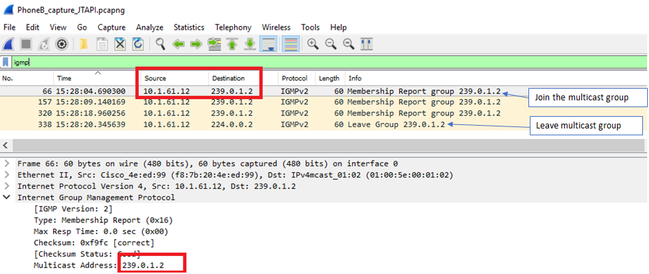
Troubleshooting tools
Multicast Testing Tool will help you to troubleshoot SNMP further.
InformaCast_LogTool will help you troubleshoot common issues experienced with implementing and maintaining InformaCast on your network.
Advance License
Customers with Advanced Notification mode are supported by Singlewire. Contact sales@singlewire.com for additional support.
Sunglewire support is available from 7 a.m. to 6 p.m. CDT, Monday through Friday at +1 608.661.1140 option 2.
Passwords
In Informacast, there are several type of passwords:
OS credentials: Used to enter Webmin and Control Center (https://x.x.x.x:10000) and when using SSH to access the InformaCast Virtual Appliance. The default user is admin while the password is changeMe.
Admin password: Used to log into the admin interface (https://x.x.x.x:8444/InformaCast/admin).
Passphrase: Used to secure your backups of the InformaCast Virtual Appliance. You must remember this passphrase. Singlewire Support personnel cannot recover it for you if it’s lost.
Password recovery
For Cisco paging server 12.5.1 and forward: https://www.singlewire.com/help/InformaCast/v12.5.1/advanced/cucm/index.htm#t=InformaCast_Fusion%2FWebmin%2FRecover_the_Servers_Password.htm
Update JTAPI in Informacast
When you initially install InformaCast Virtual Appliance or whenever you change versions of CUCM, you need to update the JTAPI library used by InformaCast Virtual Appliance to the same version used by your CUCM server.
Updating JTAPI through the Virtual Appliance will update the JTAPI version for all of the Singlewire applications that use JTAPI.
The steps are described in the section Update JTAPI In Informacast in the following guide https://community.cisco.com/t5/collaboration-voice-and-video/integrating-basic-cisco-paging-basic-informacast-with-cucm/ta-p/3161322
Common Defects
CSCve47332  Cisco IP Phone 69XX Series cannot handle spaces in Application User for Informacast
Cisco IP Phone 69XX Series cannot handle spaces in Application User for Informacast
CSCuy56088  8800 Series phone no multicast audio
8800 Series phone no multicast audio
CSCut91894  Connections from FF37 & Chrome to InformaCast fail after FF/Chrome updt
Connections from FF37 & Chrome to InformaCast fail after FF/Chrome updt
CSCtb70375  SNMP needs to alert user of DNS connectivity issues
SNMP needs to alert user of DNS connectivity issues
Related Information
- CUCM compatibility matrix: https://www.singlewire.com/matrix/cisco-platforms
- Phone matrix: https://www.singlewire.com/matrix/cisco-phones
- Upgrade paths: https://www.singlewire.com/matrix/ic-upgrades
- Server platforms: https://www.singlewire.com/matrix/server-platforms
- Hardware requirements: https://www.singlewire.com/informacast-hardware-requirements
- Technical Support & Documentation - Cisco Systems SRND: https://www.cisco.com/c/en/us/td/docs/voice_ip_comm/cucm/srnd/collab12/collab12.pdf
- CUCM Integration with Cisco Paging Server/InformaCast Configuration Example: https://www.cisco.com/c/en/us/support/docs/unified-communications/paging-server/117059-configure-informacast-00.html
- Cisco Paging Server -Quick Start Guide : https://www.cisco.com/c/dam/en/us/td/docs/voice_ip_comm/cucm/cisco_paging_server/12_5_1/QSGInformaCastBasicPaging1251.pdf
Contributed by Cisco Engineers
- Victor Gutierrez LunaCisco TAC
- Patrick KinaneCisco TAC
Contact Cisco
- Open a Support Case

- (Requires a Cisco Service Contract)
 Feedback
Feedback